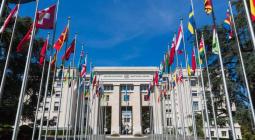UK softens stance on fossil fuels ahead of COP28 summit
Britain has signaled plans to water down its position on a core part of COP28 negotiations just weeks before the global climate talks begin.
Energy and Climate Minister Graham Stuart, who will head the U.K. delegation to the COP summit, told MPs Wednesday that he was not fixated on whether countries agree to “phasing down" or "phasing out" fossil fuels so long as the COP agreement “translates into real action.”
His comments mark a significant change in direction for the U.K. government, shifting London away from the tougher position on fossil fuels adopted by the EU. It follows Prime Minister Rishi Sunak's announcement last month that key net zero targets — though not the U.K.'s aim to hit carbon neutrality by 2050 — would be rolled back.
The distinction between “phasing down” and “phasing out” fossil fuels has become a key bone of contention between countries ahead of the COP28 talks, which start in Dubai in just three weeks’ time.
The EU has already said that it will push for the final negotiated text to “agree on phasing out unabated fossil fuels” — meaning an eventual end to fossil fuel production where carbon removal technology is not applied. The bloc has made "phase out" a key pillar of its COP strategy, with Germany’s climate envoy Jennifer Morgan meeting Australia’s Climate Minister Chris Bowen earlier this week to push for such language.
That's in line with a G7 agreement earlier this year — which the U.K. helped secure — to “accelerate the phase-out of unabated fossil fuels.”
But climate negotiators are expecting pushback at the summit. China says that “phase out” is unrealistic. Oil and gas producing countries like Saudi Arabia are expected to resist calls for more ambitious language on fossil fuels.
‘Enormous implications’
Stuart’s comments came two days after the U.K. government announced plans to accelerate its own process for issuing oil and gas drilling licenses in the North Sea. A wider rollback of interim net zero targets, spearheaded by Sunak, has led to accusations by green groups that the U.K. risks sacrificing its status as a climate leader on the global stage.
Caroline Lucas, the U.K.’s only Green MP, told POLITICO that Stuart was now “hinting at a shift in language that could have enormous implications for COP28 negotiations” and called on the government to “urgently clarify its position.”
Philip Dunne MP, Tory chair of the House of Commons environmental audit committee, also urged “clarity from the government, as a global leader on net zero, on its ambition for phasing out the extraction and use of fossil fuels.”
The confusion is understandable. Stuart took a tougher line on the same question just last month, telling a parliamentary event that the U.K. would, like the EU, be “championing” a “phase out of unabated fossil fuels.”
But appearing in front of Dunne’s committee on Wednesday, Lucas challenged Stuart over the U.K.’s refusal to sign up to a statement by “high ambition” countries — including France, Spain and Denmark — backing a phase out of fossil fuels.

Stuart replied: “Our belief is that we should focus on phasing down, phasing out, whatever it does, so long as it translates into real action [on] unabated fossil fuels.”
He added that “the language also counts, especially if we are to create the broad coalition that we need for global action.”
Asked by Dunne where the U.K. stands on the “spectrum” of “phase out” versus “phase down,” Stuart refused to go into specifics. While the U.K. wanted “maximum ambition,” he said there was “nothing fundamentally wrong with oil and gas,” adding that there had been “too much focus on supply” rather than on driving down demand for fossil fuels.
In a statement sent after this article was published, a Department for Energy Security and Net Zero spokesperson said: “The U.K. position has not changed. We committed to phase out unabated fossil fuels at the G7 earlier this year and this remains our position for COP28.
“As with any international negotiation, we need to work with other countries to reach an agreement, and the minister was simply making the point that a commitment must lead to real world action.”
Leadership role
Stuart's comments have been noted by EU allies. “The U.K. seems rather busy phasing down, phasing out, whatever, their own role during this year’s COP,” said one diplomat from an EU country, granted anonymity to speak candidly about the situation.
Climate campaigners also expressed concern.
“The U.K. government would be making an economic, environmental and electoral mistake if it was to further weaken its approach to phasing out fossil fuels at home or on the world stage,” said Robbie MacPherson, political lead at the campaign group Uplift.
Gareth Redmond-King, international lead at the Energy and Climate Intelligence Unit think tank, said the U.K.’s stance “highlights the difficulty of talking up oil and gas production in the U.K., while trying to maintain a climate leadership position globally.”
“You can’t do both. Decisions to expand North Sea oil and gas extraction, delay ending sales of fossil fuel cars, and open a new coal mine indicate little commitment to phasing out or phasing down of fossil fuels,” Redmond-King added.
The U.K. — having previously formed part of the EU bloc at COP negotiations — will this year for the first time be aligned with the so-called “umbrella group” of countries which includes the U.S., Canada and Australia.
U.S. Climate envoy John Kerry told TIME earlier this month that “in order to phase out, you’ve got to first phase down. Phase down is the road to phase out.”
Karl Mathiesen contributed reporting.





